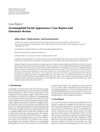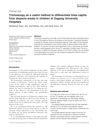87 citations,
March 2013 in “Expert Review of Anticancer Therapy” Afatinib often causes skin problems that need proactive management.
 33 citations,
September 2014 in “Reproductive Biology and Endocrinology”
33 citations,
September 2014 in “Reproductive Biology and Endocrinology” High afamin levels are linked to metabolic syndrome and may predict its development in women with insulin resistance.
 6 citations,
January 2013 in “Case reports in endocrinology”
6 citations,
January 2013 in “Case reports in endocrinology” The document concludes that AFA should be considered in patients with acromegaly-like features but normal hormone levels, and more cases need to be identified to understand the condition fully.
December 2022 in “International Journal of Molecular Sciences” Afatinib, neratinib, and zanubrutinib could be effective against KRASG12C-mutant tumors.
 58 citations,
March 2020 in “Scientific Reports”
58 citations,
March 2020 in “Scientific Reports” EGFR-TKIs can cause significant skin, nail, and organ side effects.
 46 citations,
August 2016 in “Journal of The American Academy of Dermatology”
46 citations,
August 2016 in “Journal of The American Academy of Dermatology” The study found that family history, personal history of adolescent acne, no pregnancies, hirsutism, office work, stress, and low intake of fruits/vegetables and fish are risk factors for adult female acne.
9 citations,
June 2020 in “Trials” The trial aims to test if spironolactone is an effective acne treatment for women without the side effects of current treatments.
Some alternative treatments for vitiligo show promise but need more research to confirm their safety and effectiveness.
 April 2024 in “International journal of women's health”
April 2024 in “International journal of women's health” Adult female acne is a complex condition that can worsen with menopause, requiring holistic treatment and tailored skincare at different life stages.
 October 2023 in “Siriraj Medical Journal”
October 2023 in “Siriraj Medical Journal” Acne and hair loss in women can greatly lower their quality of life, but having polycystic ovarian syndrome does not.
 April 2024 in “Journal of endocrinological investigation”
April 2024 in “Journal of endocrinological investigation” Topical minoxidil helps transgender individuals assigned female at birth grow more facial hair.
 2 citations,
August 2021 in “Australasian Journal of Dermatology”
2 citations,
August 2021 in “Australasian Journal of Dermatology” Acne in adult women is often linked to polycystic ovary syndrome, especially in those who are younger, have premenstrual acne flare-ups, and irregular periods.
 October 2022 in “Springer eBooks”
October 2022 in “Springer eBooks” The document concludes that personalized hormonal treatments are important for transgender individuals and more research is needed for non-binary treatments.
 June 2021 in “Research Square (Research Square)”
June 2021 in “Research Square (Research Square)” Adverse events in lung cancer treatments increase fear, anxiety, and depression, with newer therapies causing fewer side effects.
 August 2017 in “DOAJ (DOAJ: Directory of Open Access Journals)”
August 2017 in “DOAJ (DOAJ: Directory of Open Access Journals)” New treatments for common hair loss might be safer and more effective than current options.
January 2023 in “African Arts”  July 2024 in “Age and Ageing”
July 2024 in “Age and Ageing” Men taking dutasteride may have a higher risk of age-related macular degeneration.
 33 citations,
October 2004 in “Archives of Dermatological Research”
33 citations,
October 2004 in “Archives of Dermatological Research” Large prostate links to more hair loss, but age of onset doesn't affect it.
 26 citations,
September 2016 in “International Journal of Dermatology”
26 citations,
September 2016 in “International Journal of Dermatology” Trichoscopy is good for telling apart tinea capitis and alopecia areata in kids.
26 citations,
September 2009 in “Clinical genetics” Arab APS1 patients have unique and recurrent AIRE gene mutations.
23 citations,
April 2021 in “International Journal of Dermatology” COVID-19 may trigger systemic lupus erythematosus, requiring careful diagnosis and treatment.
 10 citations,
September 2020 in “Archives of Dermatological Research”
10 citations,
September 2020 in “Archives of Dermatological Research” Both methods improve hair density and thickness; double-spin may be more effective.
 9 citations,
October 2021 in “International Journal of Dermatology”
9 citations,
October 2021 in “International Journal of Dermatology” Tofacitinib is effective and safe for treating severe hair loss in a Saudi population.
 6 citations,
June 2018 in “Journal of pediatric endocrinology & metabolism/Journal of pediatric endocrinology and metabolism”
6 citations,
June 2018 in “Journal of pediatric endocrinology & metabolism/Journal of pediatric endocrinology and metabolism” Patients with the same genetic mutation for vitamin D-resistant rickets showed different symptoms but all improved with treatment except for hair loss.
 3 citations,
December 2021 in “Dermatology reports”
3 citations,
December 2021 in “Dermatology reports” Dupilumab can improve both atopic dermatitis and alopecia universalis.
 1 citations,
October 2022 in “international journal of endocrinology and metabolism”
1 citations,
October 2022 in “international journal of endocrinology and metabolism” People with hypothyroidism and hair loss often have more hair and scalp issues than those without thyroid problems.
 1 citations,
August 2022 in “Journal of Dermatology and Dermatologic Surgery”
1 citations,
August 2022 in “Journal of Dermatology and Dermatologic Surgery” A patient developed nerve problems as a side effect of a hair loss treatment called tofacitinib.
 1 citations,
January 2022 in “The Egyptian Journal of Hospital Medicine ”
1 citations,
January 2022 in “The Egyptian Journal of Hospital Medicine ” Cryotherapy and steroid injections are similarly effective and safe for treating alopecia areata.
 June 2024 in “Benha Journal of Applied Sciences”
June 2024 in “Benha Journal of Applied Sciences” Serum IMA levels may be linked to premature hair graying and erectile dysfunction.
 February 2024 in “Benha Journal of Applied Sciences”
February 2024 in “Benha Journal of Applied Sciences” Androgenetic alopecia is common hair loss caused by genetics and hormones.






















